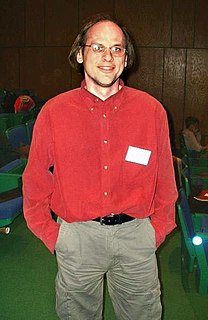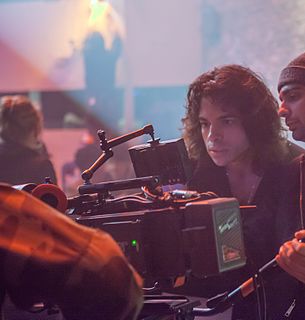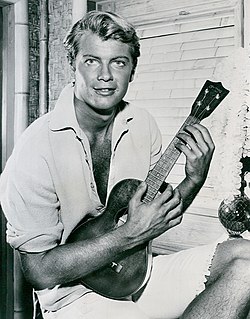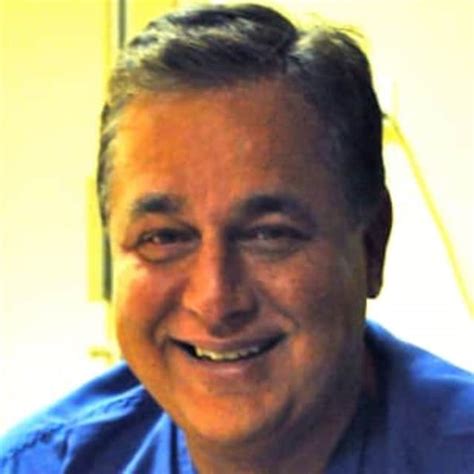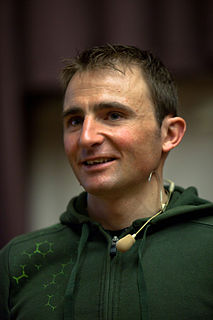Ein Zitat von Ani DiFranco
Es kann sehr frustrierend und sehr entkräftend sein, ständig von anderen Menschen definiert und beschrieben zu werden, deshalb habe ich aufgehört, irgendetwas über mich zu lesen, und ich finde es viel gesünder. Ich konzentriere mich einfach auf das, was ich tue, und mache mir darüber keine allzu großen Sorgen.
Verwandte Zitate
Mit jedem Buch lernt man so viel, aber der Schlüssel liegt darin, was man sich selbst beibringt, indem man seine eigenen Bücher schreibt und gute Bücher von anderen liest. Sie möchten sich nicht zu viele Gedanken über die Reaktionen anderer auf Ihre Arbeit machen, weder während des Schreibens noch danach. Sie müssen nur lesen und schreiben und weitermachen.
Ich finde, dass mich die Dinge nicht so sehr stören. Wenn ich am Set einen schlechten Tag hatte, drehte sich mein Rücken auf eine Art und Weise, wie es vorher nicht der Fall war. Darin besteht also der größte Unterschied: Dinge, die mir früher unter die Haut gingen oder über die ich mir Sorgen oder Ängste machte, sind einfach kein Problem. In mancher Hinsicht war es also sehr befreiend, ein Kind zu haben. Ich fand es sehr befreiend.
Als ich so jung war, hat mich das Filmteam sehr, sehr abgeschirmt, denn natürlich war ich sieben Jahre alt. Weißt du, du liest immer noch. Es ist immer noch ein bisschen wie „Katze“. "Hund." „Ann ist über den Zaun gesprungen.“ In gewisser Weise hat es mir wohl auch geholfen, in der Schule Fortschritte zu machen, weil ich so viel gelesen und so viel auswendig gelernt habe. Aber sie schützten mich sehr vor allem, was im Amityville Horror vor sich ging. Ich wusste im Grunde nichts über den Film. Ich wusste nur, dass es ein gruseliger Film war. Ich durfte es mir nicht ansehen. Ich kann es mir jetzt ansehen, ich habe einfach zu viel Angst.
Die Mathematik kann ihre Probleme haben, aber sie hat tatsächlich nicht viele der Probleme gesehen wie einige andere Wissenschaften, und so viel davon in dem, was die Leute tun, ist völlig nutzlos. Es interessiert niemanden wirklich sehr. Es gibt nicht wirklich eine Art Rechte und Linke und Leute mit Ideologie, die reinkommen, weil es keine gibt. Es hat einfach keinen Bezug zu den Dingen, über die sich die Menschen ideologisch Sorgen machen. Der Großteil der Mathematik sagt einem also einfach nichts über die globale Erwärmung oder über die Gesundheitsversorgung oder über andere Dinge, die einem wichtig sein könnten.
Das geschriebene Wort ist offensichtlich sehr innerlich, und wenn wir lesen, denken wir. Es ist eine Art spirituelle, meditative Aktivität. Wenn wir visuelle Objekte betrachten, sind unsere Augen meiner Meinung nach offensichtlich nach außen gerichtet, sodass wir nicht so viel Zeit zum Nachdenken haben. Und es sind die Nachdenklichkeit und die spirituelle Innerlichkeit des Lesens, die mich ansprechen.
Glaubst du, man kann zu viel lieben? Oder zu viel Schönheit auf Kosten von zu viel Schmerz erleben? Glauben Sie, dass wir eine Grenze der „Normalität“ ziehen können, wenn Kunst dadurch definiert wird, dass sie so viel Schönheit und so viel Schmerz zum Ausdruck bringt, nur um mit beidem klarzukommen – und anderen Menschen auf Kosten dieses Schmerzes etwas kreativ Schönes zu bieten? ? Es ist wichtig darüber nachzudenken.
Eine Hinsicht, in der ich dem Sohn meines Vaters sehr ähnlich bin, ist meine Einstellung zu Joyce. In „Ulysses“ geht es vor allem um das tägliche Leben, wenn man in das Leben dieses anderen Mannes eintaucht und erfährt, welche Dinge ihm am Herzen liegen und warum er sich um sie kümmert. Und dann erfährt man ganz indirekt und ganz subtil, warum die Politik auch sein Leben beeinflusst hat.
Und es ist irgendwie auch meine eigene Schuld, in dem Sinne, dass ich mein eigenes Leben so oft als literarisches Mittel genutzt habe. Ich denke, die Leute fühlen sich sehr wohl, wenn sie meine Idee rezensieren, im Gegensatz zu dem, was ich tatsächlich geschrieben habe. Ich stelle fest, dass die meisten Leute, wenn sie über eines meiner Bücher schreiben, in Wirklichkeit nur darüber schreiben, was ich ihrer Meinung nach als eine Art abstrakte Entität darstelle oder auch nicht. Ist das unfair? Nicht wirklich. Wenn ich mich in die Lage versetze, Elemente meiner Memoiren in fast alles einzubinden, dann wird das wohl passieren.
Ich habe keinen Einfluss darauf, ob und wie sich die Leute an mich erinnern, wenn ich nicht mehr da bin. Für mich ist es wirklich gefährlich, herumzusitzen und sich zu viele Sorgen zu machen. Es bringt mich zu sehr dazu, mir Gedanken darüber zu machen, was die Leute über mich denken werden, wenn ich nicht mehr da bin.






